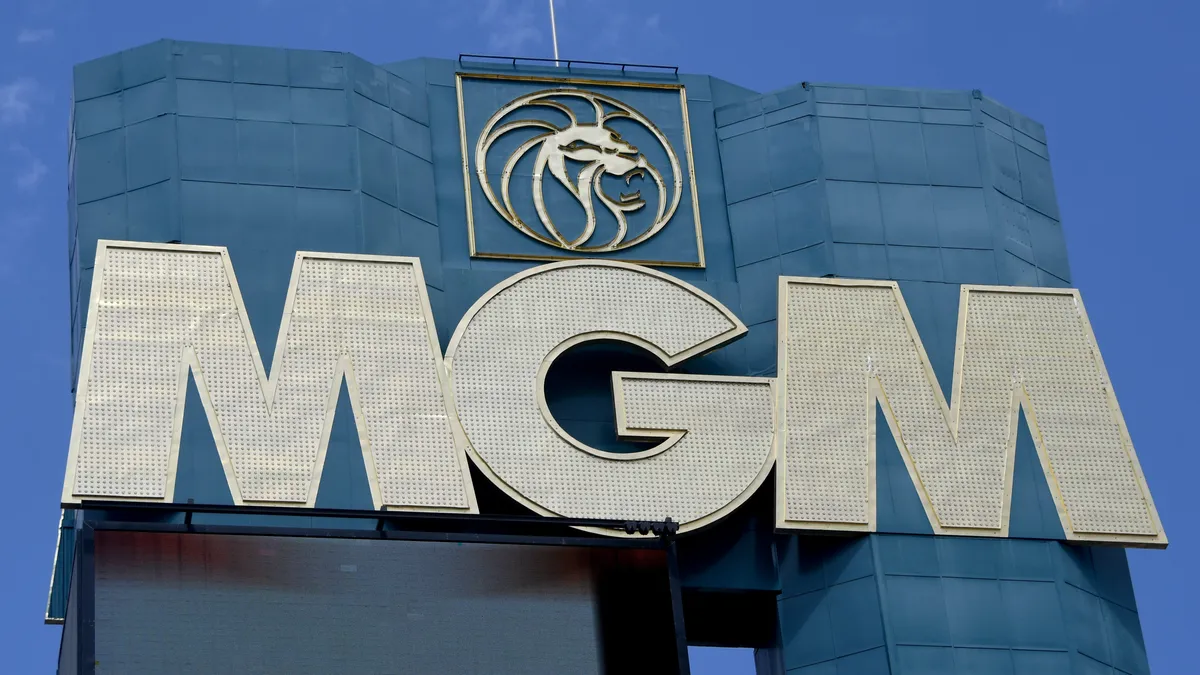Despite jobs growth in the accommodations sector in recent months, employment at hotels still lags behind pre-pandemic levels.
These shortages are especially poignant as the holiday season fast approaches. In New York City, particularly, which is experiencing a crackdown on short-term rental platform Airbnb, hotels are gearing up to accommodate more travelers than in years past.
Staffing experts shared with Hotel Dive how hoteliers and managers should be preparing to hire and retain workers during this busy time of year — starting with approaching hiring in a new way.
Holiday hiring
Holiday hiring across many U.S. industries, including hospitality, is already underway, Amanda Hahn, chief marketing officer at HireVue, a full-service recruitment solutions company, told Hotel Dive.
Hiring for the holiday season typically starts in the third quarter of the year, Hahn said. And this year, there’s been an even greater push in the hospitality industry. HireVue saw a 45% increase in third-quarter interview volume in the sector this year versus the same time period last year, Hahn shared.
This interview influx, she added, paces with jobs growth across the country. In September alone, the U.S. leisure and hospitality industry increased by 96,000 jobs, 16,000 of which were in the accommodation sector.
During the holiday season, hotels are typically looking to fill more housekeeping, front-of-house and back-of-house restaurant roles, Hahn said. She noted front-desk staff, as well as valet and shuttle drivers, are also typically in demand, but that “seasonal hiring for hotels is wholly dependent on the location and amenities of the establishment.” Properties at ski resorts, for instance, may need more shuttle drivers than a location built on beachfront property, she said.
Filling these critical roles, which hoteliers already struggle with during normal times of the year, becomes even more important during the holiday season because of the influx of guests.
According to a recent study by Deliotte, nearly half (48%) of Americans intend to travel this holiday season, and travel between Thanksgiving and mid-January is up across all age and income groups. Additionally, more than half (56%) of holiday travelers plan to stay in hotels, up 21% from last year.
Josh Felix, director of solution design at Axonify, a frontline workforce solutions provider, predicts the amount of travelers staying at hotels in New York City specifically will increase significantly due to new regulations surrounding Airbnb.
New York City hotel searches for stays during the Christmas holiday (Dec. 15 to Jan. 2) are already up 11% year over year, as reported by Skift.
Because of the influx of guests that hotels can expect during the holiday season, both Hahn and Felix said it’s imperative for those doing the hiring to be prepared.
Filling the gaps
First things first, Felix said, hotels need to identify their skills gaps — whether that’s by position, scheduling conflicts or number of staff on hand — and fill those lacking areas.
While across the board more than half (52%) of frontline managers admit it’s getting harder to find seasonal workers, according to Axonify, hoteliers are faced with a specifically difficult task, as they’ve been short-staffed all year. In May, 82% of hoteliers surveyed by American Hotel and Lodging Association said they were experiencing staffing shortages, with 40% ranking housekeeping as their top hiring need.
As a result of these shortages, HireVue has seen significant adoption of assessments in hotels, Hahn said. “By using assessments instead of screening resumes for past work experience, businesses are able to assess for skills that are relevant to on-the-job success with an automated, unified and engaging assessment that doesn’t overlook people with the potential to thrive,” she added.
Felix suggested hotels consider more flexible scheduling to fill identified gaps. This allows cross-skilled workers to pick up shifts that businesses desperately need filled and gives workers autonomy to work when they want.
Workplace flexibility is becoming a significant motivator for attracting and retaining staff, particularly in the hospitality industry.
The use of AI, like in HireVue’s text-powered recruiting assistant, can also be helpful to owners or managers during the hiring process, Hahn said. Conversational AI can help hoteliers and other professionals hire workers four times faster by engaging candidates all the way through the hiring process, she added.
“Technology built for high-volume hiring finds candidates through a process that can be done in one day,” Hahn said. “This kind of automation increases efficiency and returns time to managers, so they can get back to their primary role of serving customers.”
Training tips
Once a worker is hired, it’s important to optimize training to save time and other resources for both the hotelier and employee, Felix said.
“The days of us being able to take a ballroom or meeting room with 15 of our housekeepers in there for three hours and teach them or lecture to them or fire hose them with information, those days are done,” Felix said. “We just don't have the ability budget-wise or staffing-wise to do that. So, we need to make sure that learning is taking place in the flow of work.”
According to Felix, training has evolved and can take place in the form of “micro learning.” For New York City hotel workers, for example, this could mean participating in a training module on their mobile device while on their subway ride to work.
“That investment from the hotel operator or manager on their budget is worth it to pay that worker an extra 30 minutes for them to do training on their phone during their commute to allow them, when they reach the property, to be focusing on the guests,” he added.
Beyond initial training modules, it’s beneficial that hotel workers participate in reinforcement training exercises, especially ones that are personalized to the worker, Felix said.
Hotel operators can reiterate information that’s presented to their workers in initial training by asking questions, Felix said. The workers’ answers can tell the operator how well that information is being absorbed and if the employee has confidence in their training.
“It is one thing to be able to test well, it’s another thing to be confident in the knowledge that you’ve tested,” Felix said. “It's important that we're driving competence as well as knowledge mastery.”
This reinforcement would look different for every employee, he said. For example, if there’s a front-desk employee who will frequently handle an elite loyalty member coming to the desk with a question, that worker’s training should reinforce specific ways to handle that situation.
For cross-skilled workers, this reinforcement method still applies; they will just be reinforced on multiple areas or scenarios at the property, Felix noted.
With this method, each employee on-property will not know every detail about the hotel, but that’s OK, Felix said. He suggests hotels allow workers to carry a mobile device, whether a phone, iPad or something similar, to look up information about the hotel that they might not specifically be trained on. For example, if a guest asks a housekeeper when the property’s airport shuttle leaves, the worker could use their device to look up the answer, on the spot.
And that efficiency can lead to a better guest experience, Felix noted. “If I can deliver that answer, and not mislead the guests or tell the guests, ‘I don't know,’ it makes for a better experience.”















